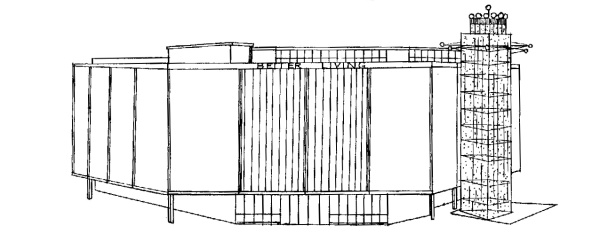- FEATURES
- The Better Living Center is a showcase for companies whose
products and services contribute to a better and fuller life
in six major areas: fashion, food, health, home, family security
and leisure.
-
- Exterior: The Better Living Center is the largest
multiple-exhibitor pavilion at the Fair. It is an 80-foot high
hexagon-shaped structure enclosing a quarter million square feet
of air-conditioned space, making it the largest exhibit building
in the Fair's Industrial section. A major identifying feature
of the building is the glass-clad observation-elevator tower
adjacent to the structure. Two high-speed glass elevators take
visitors to the rooftop, giving them a panoramic view of the
entire Fair grounds from the 16-sided regular polygon glass tower.
The unique "from top down" traffic flow assures each
exhibitor maximum exposure. One-way escalators and the two glass
elevators provide access to the top floor.
-
- Interior: Women's Headquarters: The official
center of all women's activities at the Fair is located on the
penthouse floor of the pavilion. The Women's Advisory Council
has its headquarters and hospitality center here. The interior
design was executed by William H. Pahlmann in the style of colonial
Williamsburg.
-
- Also located on the rooftop is the International Cafe
operated by the Hilton Hotels Corporation, serving the most unusual
dishes of all the countries in which Hilton International operates.
Hilton chefs are brought to the Fair to supervise the preparation
of their ethnic specialties. The Marco Polo Club also
operated by Hilton, is the private club for Better Living Center
exhibitors and their guests. Its decor duplicates that of the
famous Marco Polo Club at the Waldorf-Astoria.
Adjacent to both the Women's Headquarters and the International
Cafe is an art gallery devoted to American art. In addition,
selections form the collection of Vincent Price are placed at
various points throughout the Better Living Center. In conjunction
with the exhibits, a series of art lectures is scheduled.
Located on the second floor, the Crystal Palace of Fashion
is a major fashion presentation facility at the Fair. This showcase
schedule daily fashion shows for the entire run of the Fair.
The first show, beginning on the Fair's Opening Day and to run
for 30 days, is presented by Lord & Taylor. Subsequent shows
are to be staged by editors of such leading publications as Glamour,
Seventeen, Look, Mademoiselle, Good Housekeeping
and Harper's Bazaar. The stage of the Crystal Palace is
a series of elevated platforms suspended over a reflecting pool.
Rising in amphitheater fashion from stage level is a series of
43 exhibit kiosks where wearing apparel, accessories and cosmetics
are shown.
The main feature of the Center is a fully-furnished, seven-room
home designed and decorated by Dorothy Draper. The $55,000
home features appliances, fabrics and materials that will soon
become generally available. Some of the upholstery, drapery and
flooring materials have been specifically designed for the Dream
Home.
The Gallery of Better Living Kitchens is a group of
8 kitchens, varying in style from traditional to contemporary,
reflecting the latest trends in kitchen design and layout.
"Food from Farm to Table" is the theme of
a group of exhibits depicting products and services of food manufacturers
and processors, arranged to simulate a supermarket. The core
of the exhibit is a 40-foot glass-walled truck trailer containing
a 90-day supply of food for an average American family.
Radio Station WTFM, the only full-time FM stereo station
in the New York metropolitan area, has its World's Fair studios
located in the Better Living Center.
Shick presents a panoramic history of shaving, featuring
some of the unusual implements men have used through the ages
to remove their whiskers. Included is a facsimile of one of the
first razors known, made from obsidian, a volcanic glass which
dates back nearly 5,000 years.
The National Industries for the Blind has four separate
exhibit areas, occupying 500 square feet. The visitors first
view an illuminated map showing the key cities throughout the
nation where workshops are located. A visitor may push a button,
pick up an earphone and listen to a description of the workshop
and agency facilities available in the selected area. The visitor
moves on to view an enclosed work area where blind workers will
demonstrate their skills. The workers are visible at first, slowly
fade to absolute blackness and brighten again -- to simulate
visual handicaps. The next area displays the range of Skilcraft
products and provides a place for distribution of order forms.
"All About Elsie" is a musical revue, repeated
each quarter hour, starring Elsie the Cow -- with songs, dance
and dialogue by a supporting cast of electronically controlled
and animated characters. The revue is produced by Alfred Stern
with the script written by Joel Oliansky. The music and lyrics
were composed by Kay Swift.
|

